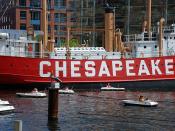England's burning desire to spread it's territorial boundaries, primogeniture, and it's lack of natural resources and living space led to the English colonization of America. The New England and Chesapeake region colonies were both founded in hopes of a new life, but each for a different kind of new life. Although both colonies were technically under English rule, they developed into, in most senses of the world, contrasting colonies.
The Chesapeake colony was founded mainly for the three g's"ÃÂgold, God, and glory. Settlers wished to become wealthy quick and live like kings (Doc F). Many people who came to the Chesapeake region were indentured servants. Most of these servants were young males in their twenties, some of them the result of primogeniture. Very few females came to this area and if they did they were very rarely married or with children (Doc C). The few people who were not indentured servants were members of the select aristocratic families that seemed to have a stronghold upon the life in the Chesapeake region.
On quite a different note, the New England colony was founded out of the desire to be able to practice religion, no matter what genre it was, freely. The tragic irony of this situation is that the puritans that came to New England wishing to escape religious persecution began persecuting those who did not follow their system of beliefs. Families flooded the boats on their way to the "city upon the hill,"ÃÂ the religious community that was supposed to be a model for all society, some of them looking for precious land that was so scarce in their mother country of England (Doc A). Emigrants into the new country consisted mainly of whole families of middle aged people. They could be perceived as wealthy, for they brought along servants since the often planned on staying in the new land (Doc B).
The dominating religion of the Chesapeake colony was that of the Anglican Church. Although this was the most widespread religion, any religion was accepted in this area. People who sought to truly practice religion freely without being governed or prosecuted by the English government or the new colony were better off in the Chesapeake colony. The whole colony in New England was based upon religious expectations and traditions. The stifling, puritan religious atmosphere would suffocate those of a different religion. Religious freedom was a charming idea but was not widely practiced here.
Next, the economies of these two areas differed greatly. In the New England area, they planted crops upon arrival, preparing for a home life. Since most of the settlers in this area were families, they had to grow food for more than just one or two people. Many of the older male settlers in the area were skilled in a certain craft"ÃÂsuch as shoemaking or iron working, both of which were illegal. Commerce and trade became very popular in this area since most people lived on family-run farms. In the Chesapeake area, they rushed to search for gold, just as the Spanish had foolishly done earlier (Doc F). When the search for gold became quite dismal, they looked for new ways to make money. They discovered that tobacco grew well in the soil and that it brought colossal amounts of money when sold. Tobacco, the new cash crop, became their new focus. Plantations grew in number when people started to become wealthy due to the success of the tobacco crops. Tobacco was a difficult crop to upkeep and entailed hard labor. Many of the plantation owners were not capable nor willing to do it themselves or subject their families to such harsh work, so slaves imported from Africa became very popular on the plantations. The idea of African slavery caught on quickly across the entire south due to the cost savings to have African slaves as opposed to hiring people living near the plantation.
Political life was an interesting issue since England was supposed to be monitoring the activities of their colonies. England was engaged in home matters, such as religious turmoil, wars, and the continuous changing of rulers and did not have enough time to closely monitor all the events that happened in their colonies. England was also indifferent at first as to the political workings of the colonies because the colonies supplied large amounts of funds to England to keep them pacified. In the Chesapeake region, a few aristocratic families ran the happenings of the area. Only white males who owned land, sometimes only plantation owners, were allowed to make decisions concerning the whole colony. Women very rarely owned land and were not considered capable of making competent decisions. In New England, however, the tide had changed. The decisions about the colony were made by anyone who owned land, male or female, no matter how much they owned. This area also had a written constitution, but not much adhering occurred to it. Involvement and protection of the community as a whole was stressed much more here than in the Chesapeake area (Docs D&E). In the Chesapeake, the government was very unstable so that very little to no communal decisions and/or actions could be taken for the region (Docs G&H). These two different areas had contrasting views on how to run their colony, although both strayed from England and its policies.
Lastly, the geographic and climatic conditions varied greatly between the two colonies and also affected life in these areas. In the Chesapeake area, the area was filled with swamps and warm summers. This led to mosquito infestation and then to disease. The sanitary conditions here were not as good as in the New England area. These factors greatly reduced the life span by, on average, fifteen to twenty years. The New England area had poor soil that was not good for growing many crops but they had access to water and built harbors that turned out to be very resourceful and profitable for them. Not only did they benefit due to shipping capabilities but also from the large amount of food they were able to obtain from the water. The conditions and weather in the New England colony were more favorable for living and produced a more promising quality of life.
If someone looked at either of the colonies, it would be similar to looking at a portrait of its inhabitants. The people and the way they lived largely determined how the colony would end up. They decided what religions would be allowed, what crops would be farmed, how to use the land, what industries would be widespread and even who they allowed to decide the fate of the colony. The settlers came from the same place where their differences were emphasized. As history would have it, they moved to different areas to produce colonies that even further magnified their differences, which is what makes them so very similar.



